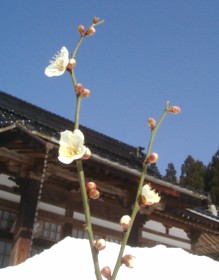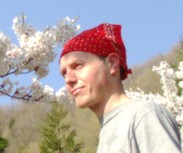|
... Wipe your own ass ...
April 2004 |
 |
[prev] [next]
|
Raw human flesh (Adult practice - Part XII) |
Shortly after arriving at Antaiji, one of my later Dharma brothers wrote in the Antaiji yearbook: "Antaiji is not a school. Even though people here may be given a task, it is still up to them to solve it. Each one of us has to search for himself, penetrate it by himself. Nobody will teach you here. So the questions is: How much, in what way, will you knock on the door that you want to be opened?" Three years later, he writes "before I realize it, I am fast asleep, my sitting posture has crumbled, and - once I correct my posture and try to return to zazen - I start thinking again." So how did he work with that problem once he discovered it? The next year, 1991, he writes again in the yearbook: "When I sit in zazen I want to do work. Or I sleep. When I am the tenzo (cook), I would rather sit in zazen. And even though I know that zazen consist of upright sitting, because of the pain in my legs I start to shift and my posture crumbles, and sooner or later both my body and mind will give in to deluded thoughts and sleepiness... Why can I sleep peacefully during zazen!? When I say that I must not sleep during zazen, am I not saying it comparing myself to the others? And when I say that I am NOT sleeping because my eyes are wide open, isn't it just that I am fooling myself, really being lost in delusion? ... I know the answer. But in reality, I don't know anything. What I know is only my intellectual understanding, fashioned in a way to please my ego... Unless I really start to practice and become one with upright sitting, I will only waste the time of my life in the clouds of my eyes." I wonder where this strictness that my Dharma brother had with himself and his practice went some years later? If someone is so clear about his own problem, why would he say later that it was all the teachers fault? Was his reflection on his practice and his self-criticism also only some intellectual affair that had nothing to do with the actions in everyday life? Many of the more intellectually inclined people face the problem that practice exists more in their heads than it is manifested in their bodies. Whatever his problem was, my Dharma brother took a straight look at it once a year, when he wrote for the yearbook. Failures in the kitchen, fights with his juniors, bitching behind the abbot's back and being yelled at later when the abbot hears it... all of what he wrote is interesting for us who do the same practice and walk the same path. Although I am critizing my Dharma brother for what he writes, I can learn from his articles even now, more than ten years after he wrote them. Unfortunately, I do not have the time and space here to quote all that which would be interesting to read. Still, we are not talking about my Dharma brother's personal problems here, but about a problem that all of us practing here at Antaiji and maybe in many other places elsewhere are facing. If this problem isn't solved, we are wasting our time with infantile practice. This has happened to too many people before, and that is why I should like to continue to focus on the problem for a little longer. The problem why it is so difficult to practice, and what practice is in the first place. I want to make some more quotes from the Antaiji yearbook. First from another of my seniors, who was the head monk at the time, from the same Antaiji yearbook of 1991: "When we are busy in our daily lifes, we want to do zazen. When we do zazen, we start to sleep, or we start to think, and we would rather cook in the kitchen or work outside, or maybe we want to return home to our families... Counting the breath or concentrating on the koan of 'character MU' is disliked here. But without making any effort people will just fall asleep in a place like here where we do not use the kyosaku (wake-up stick). How long will we have to wait until we wake up by our own? And once you wake up, you are all tired from sleeping in a crumbled posture. You do kinhin (walking meditation), refresh your mind, and sit again: Only to sleep once more... When you sleep, you can't do anything. Have you really read Dogen Zenji's Fukanzazengi (both 'Rufu-bon' and 'Tenpukuji-bon'), Shobogenzo Zazengi, Shobogenzo Zazenshin? Have you really thought about it yourself? And do you really sit yourself? ... Have you been trying for a 250 thousand times. And don't laugh about Keizan Zenji's Zazenyojinki either. Shure, there are times when the pain in your legs and hips plays tricks on you. But can you really excuse yourself with the pain? Where does the strength that transcends your conscious effort, the strength that neither comes nor goes come from? As long as you haven't clarfied this, don't sleep so peacefully! Until you reach this state, your great problem won't allow you to rest and sleep. Once you reach here, your problem will be solved and you can sleep peacefully. That is ok as it is. On the other hand, you will also have to deal directly with a new problem that will arise just here and now. It is said that zazen is the true form of the self. How comes that this 'true form of the self' is always fast asleep during zazen!?" Reading the articles of these two Antaiji monks, we can understand what the practioners at that time were discussing in their free time after evening zazen. There was always some kind of "Dharma combat" going on over tea or other refreshments at night. Not the kind of ritual "Dharma combat ceremony" that is practiced in some Zen centers of course. "When at work, you want to do zazen. When siting in zazen, you would rather be at work.." - both monks address this same problem. I think they are talking about their own problem, but at the same time it seems as if they were trying to appeal to some invisible other person: "It is said that zazen is the true form of the self - how comes that I am sleeping during zazen, although I am doing my best?" If this question is directed to anyone else but ourselves (but who could that be in the first place?), we will have to wait forever for an answer. It is our responsibility to find it. Unfortunately, the head monk himself left Antaiji the following year, continuing to criticize "Antaiji practice" for years to come. The point is that there is no such thing as "Antaiji practice" - it is your practice. When you practice at Antaiji, your practice consist of "creating Antaiji". So don't blame anyone for the Antaiji you created. Don't blame anyone for the life you've created for yourself. Let me talk more concretely about the practice that is at the center of our lifes here: Zazen. When the head monk said that "counting the breath or concentrating on the koan of 'character MU' is disliked here", what did he really mean? Last month I already wrote that neither Dogen Zenji nor Sawaki Roshi or anyone else prohibited concentrating on the breath. Sawaki Roshi even quotes Keizan Zenji's admonition to count the breath when it is too difficult to concentrate. And in the "Gakudoyojinshu", Dogen Zenji deals with the koan of character MU. Of course, Dogen Zenji does not treat it as one out of a thousand of questions which have to be solved one by one by the student, who meets with his teacher daily in the "dokusan room" (this form of practice can be done in a Rinzai Zen monastery). After quoting the koan of character MU, Dogen Zenji continues in the Gakudoyojinshu: "Can you think character Mu? Can you grasp it? Really, there is nothing to get a hold on there! So I ask you, please, let go for an instant. Let it go and take a good look: Who are you? What are your daily affairs? What is your life and death? What is this Buddha-Dharma in the first place?" From this it should be clear that working with the koan of character Mu for Dogen Zenji means to let go and take a straight look at oneself. This of course is something that isn't disliked at Antaiji, but quite on the opposite absolutely necessary for each of our's practice. Both working in this way with a koan as well as concentrating on the breath are necessary parts of the whole landscape of our zazen practice. I think it is interesting when we read both Sawaki Roshi's admonitions for zazen as well as Dogen Zenji's Fukanzazengi or Shobogenzo Zazengi that they devote quite some time to talk about the physical posture, but then use only a few words to talk about the breath and mind. In both the Fukanzazengi and Zazengi Dogen talks in detail about where to sit, the cloths and food, the posture of the thumbs and even the tongue in the mouth. In contrast, about the breath and mind he has only this to say: "Breathe through your nose. ...(First) exhale fully and take a breath. Sit stably in samadhi. Think of not-thinking. How do you think of not-thinking? Beyond-thinking. This is the way of doing zazen in accord with the dharma." (Zazengi) "Breathe softly through your nose. Once you have adjusted your posture, take a breath and exhale fully, rock your body right and left, and settle into steady, immovable sitting. Think of not thinking. Not thinking: What kind of thinking is that? Letting thoughts go (Nonthinking). This is the essential art of zazen." (Fukanzazengi - Rufubon) That is all! But how can it possibly be all!? I think the reason is as follows: We are usually talking about adjusting the physical posture, then adjusting the breath, and lastly adjusting the mind. The problem is that it is a mistake to think about these "three adjustments" as seperate. The reason why Dogen Zenji can only say "breathe through your nose and think of not-thinking - how do you think of not-thinking? ...beyond-thinking" is not that the issue is fundamentally beyond words. When Dogen Zenji talked about adjusting the physical posture, he already said everything. Not because the body is more important than breath or mind, but because it is one with breath and mind. When we start with adjusting our body, we must not forget that we are already adjusting our breath and mind at the same time. Adjusting the breath and mind does not come afterwards, after we have found the right way to sit in the posture. This shows just how important it is to sit in the right way - what Dogen Zenji simple calls "upright sitting". In the Tenpuku-version of the Fukanzazengi, which came before the Rufubon-version, young Dogen devoted just a little bit more to the state of the mind in zazen: "When you have adjusted your physical posture and your breath, be conscious of the thoughts that arise in your mind: Let go off each thought the moment it arises. Don't let yourself be driven around by your surroundings. Just be yourself - this is the art of zazen." Put into even simpler words: Sit straight and let thoughts go! The reason why the posture is valued so much, using Sawaki Roshi's expression, is because we manifest Buddha by twisting our raw human flesh - we won't become buddhas by twisting our brains. As long as we reflect about our practice only in our heads, it won't mean anything. That is why Sawaki Roshi says "Zen isn't spiritual, we do it with our body" or "the point is what you do with your muscles and bones". Only on this basis can he say that zazen is the "self making the self into the self".
(To be continued ... Docho)
|
|---|
 |
| A Mail From Down Under |
I have been back in Australia for about 3 months now.
Many people were fascinated by my account of the 7
months I spent at Antaiji, and of course it forced me
to reflect on shikantaza, on the value of "letting
go".
It's been quite a challenge to incorporate this into my everyday life in a big city. I am now working at some organic fruit and vegetable shops in Melbourne; it's wonderful to be handling such fresh produce. When I first started working there, my boss told me: "You will learn to see, hear, smell and taste again". For a moment I thought he was smoking too much pot! But actually it turned out to be true. Awareness. That was probably the biggest thing I learnt at Antaiji. It's so important, and especially in a fruit shop where there are many degrees of ripeness, colour, smell, etc. And concentration. Being told things only once by others, and understanding and doing them. I sit so often these days that, during other times, I can feel when my head is going crazy, when I'm daydreaming. And the more you sit, the more aware you become of your thoughts during non-sitting periods, so you get better at catching your mind, letting go of your thought and returning to the present. This seems to be the heart of Zen; I feel I can practise this everywhere, every moment, until I die. But I remember someone said his big dilemma was that after leaving Antaiji, he may slip into his old habits, and not know if he was practising properly. I never understood this dilemma. I feel that if you take responsibility for your actions (unlike your complaining dharma brother), practise "letting go" in every part of your life, and concentrate on the present, you don't need someone to tell you if you're practising correctly. Don Juan in Castaneda's books talks about inner silence being our connecting link with the Spirit, or Force, or Ki. We only need the Force itself; a teacher's role is to guide us (an important role, of course, but ultimately it is the connection with the Force which matters). In Zen terms, this can be thought of as 'finding the true self'. It's funny, but shikantaza seems to have a hidden aim: inner silence. This idea of inner silence can be quite an attachment. But if you truly sit without any aim at all, you tend to just daydream, which is not zazen. So it's the paradox: you must aim to 'let go'. It's doing without doing, trying without trying. You aim to let go of thought and achieve silence, but are never disappointed when you can't, because thinking is the brain's natural process. If you are disappointed, then obviously this aim has became an attachment. So you must aim without being attached to the aim. It's very difficult. Without an aim we lose faith and daydream; with an aim we fail and get disappointed. Adult practice, to me, is to strive always for this aim, without getting disappointed, to the day you die. I feel that Dogen and other Zen guys are reluctant to voice this aim. They don't want to say "Inner silence is important; it is the aim of zazen". But it clearly is important, and the aim. I know inner silence is not appropriate for every situation in life, e.g. talking with humans, giving a Buddhist talk, or thought related to the task at hand. But it is appropriate for many many situations. Most times, "concentrating on the present" means "inner silence". It's the same thing. By the way, I should also say that silence, as a thing itself, is just silence. Sound is just sound. Silence feels good, but so what? Many things feel good. The point is that we connect directly to the Force. That's why silence is important - we are like a little AA battery, being charged by millions of volts of energy. We go directly to the source of life, of the universe, through our silence. When we think, we cut reality off, we cut the Force off. Thoughts take us away from the present. Take care
(Joel)
|
|---|
 |

